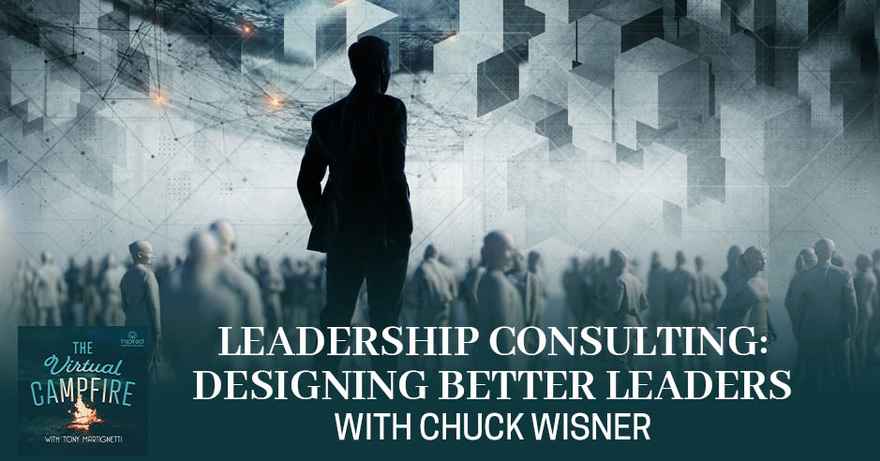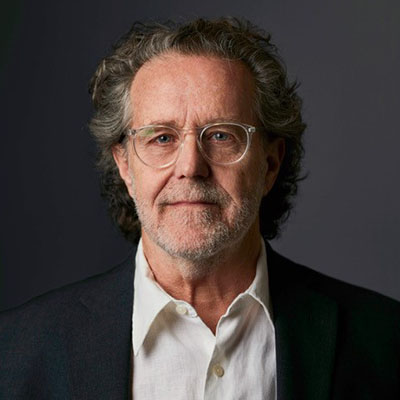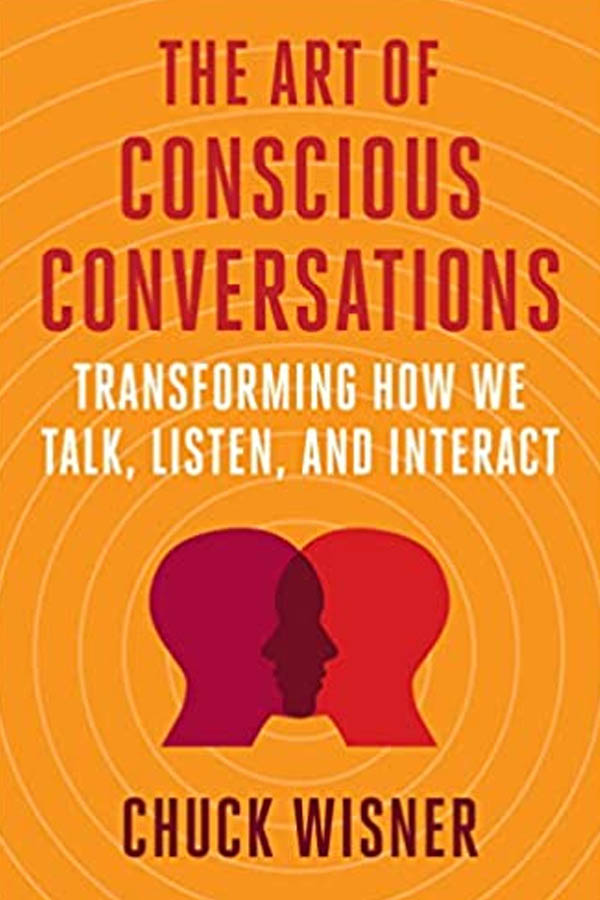Leadership Consulting: Designing Better Leaders With Chuck Wisner

Anyone can be promoted into a leadership position, but not everyone is inherently a good leader. For this reason, leadership consulting is an investment most companies are willing to make. Joining the podcast today is Chuck Wisner, author of the book The Art of Conscious Conversations. Chuck talks with Tony Martignetti about his book and his principles in training a new breed of leaders. Also, Chuck shares his journey from architecture to leadership consulting. Tune in to find out how he pivoted between two seemingly disparate careers and found his purpose.
---
Listen to the podcast here
Leadership Consulting: Designing Better Leaders With Chuck Wisner
It is my honor to introduce to you my guest, Chuck Wisner. He is a highly sought-after thinker, coach, and teacher in the areas of organizational strategy, human dynamics, and leadership communication excellence. He has spent 25 years as a business and personal consultant, and a trusted advisor to leaders in high-profile companies across industries, including Google, Apple, Tesla, General Motors, Ford, and others.
His methods are anchored in years of leading-edge research, theoretical development, and the practical application of the foundations of conversations. He is the author of the book, The Art Of Conscious Conversations: Transforming How We Talk, Listen, And Interact. He lives in Manchester, Massachusetts with his wife Kata, who is an artist, and his two sons who are living out their creative dreams in New York. I'm thrilled to have Chuck join me on the show.
Thanks for having me. I’m happy to be here.
I'm looking forward to it. I'm thrilled to have you on and I'm looking forward to talking about your story and your journey to getting to where you are. I love your book. It's such a great idea to share some of these concepts with people. It's badly needed today. It's going to be a lot of fun. The way we do things on the show is we walk to journey through people's stories to understand how they get to where they're making such an impact. We'll go on a journey of understanding your story through what we call flashpoints. These are points in your journey that have ignited your gifts into the world. In a moment, I'm going to turn it over to you and ask you to share the moments that have made you who you are. Along the way, we'll pause and see what's showing up.
It has been quite a long journey for me. When I was around 18 or 19, I got introduced to some Eastern philosophy and meditation. I started this journey of self-awareness meditation way back then. That was a flashpoint for me. It sort of changed. I had an early upbringing with the Lutheran religion, which didn't work very well for me. This was a real shift. That was carried through my whole life because it gave me a particular philosophical perspective on life that allowed me to be open to change. My first career was in music. I'm a percussionist. I played music. That was what I did in high school, then years after that, professionally. That was pretty exciting.
There was a transition into architecture, which is a long story. I moved to Boston from a small town in Pennsylvania to go to an architecture school. That was an amazing education. I ended up working as an architect in Boston for twenty years. In that process, I learned a lot about conflict. If anybody in the audience has rebuilt or renovated a house, we know how complicated it is and how many things can go badly wrong, and who fights over who over what.
I learned about conflict. We had a partner who was having trouble with alcohol. We hired some help because we didn't know what to do with this problem because he was affecting our clients and staff or employees. This help came in by the name of Linda Reed who at that point is a consultant. How she met with us and interviewed us made sense of the whole thing. She gave us good feedback individually and collectively.
She got us through to another end where we came out with a great result. I was amazed by what she did. With my interest in psychology, philosophy, and spirituality, it seemed like she did a piece of magic. How did she do that? I fell in love with what she did and I spent four years retooling myself. I then changed careers once again and started doing leadership advising and consulting with the foundation around the ontology of language. That was a major leap for me and I haven't looked back since.
I love that transition and this field that you're in. Architecture is one of those things that I am super passionate about myself. It's fascinating to see that jump and then see the challenges that you face, it is seemingly where you're heading now, which is interesting.
To write the book was another thing. Through all this, the ongoing theme or lesson that I learned was when something caught my imagination, my heart, and my mind, I will be drawn to it. The voice kept coming, “If you don't go or try, you won't know. If you don't give it a shot, you won't know.” It was true leaving my small town in Pennsylvania to come to Boston to go to architecture school. Some people thought I was nuts. If I don't do it, this burn and attraction I have, I'll never know. That was true in each of the transitions.
Sometimes the simplest things are what you need to guide your life. It's a principle that keeps you moving forward.
Sometimes, the simplest things are what you need to guide your life.
It's that deeper listening to your intuition.
I also want to speak about this thing that you had in your own life, which is the conflict of religion. A lot of us experience this early on. Not to say that our parents are bad people or anything like that, but we have an upbringing. We want to challenge that and say, “I want to have my own beliefs and thoughts about what is real.” Maybe it's even integrating aspects of different things. Maybe there are Eastern and Western, and ways to co-mingle those ideas. That's what conversations are. It's a co-mingling.
When we learn how to do it and we do it, we forget the power that has. It's a creative force. That's where creativity comes from, out of that interaction.
Tell me what happens next along your journey because you are far from where you are now. Tell me some other flashpoints or moments that have made you into who you are.
Having children was a big flashpoint. That's an eye-opener. I have two sons. They're in their 30s. We have a great relationship and I'm thankful for that. One of my sons got married in New Orleans on New Year's Eve. Children were a big flashpoint. Four or five years ago, this idea of a book was in my consciousness for a while, but the idea of writing a book became serious. I had a big story that I couldn't write and that I wasn't a writer because I wasn't a writer.
I was an architect and a musician. I went through a few years where I hired people to help me write the book. It never worked. In some cases, they got so involved that they wanted the book to be our book. In other cases, it didn't work stylistically. One day, I was walking with my wife on the beach and I said, “I'm going to start over and write this thing myself.” I had to bust my own story that I couldn't write. It's not to say I don't have great editors and I don't have great help, but I'm not afraid to put pen to paper or finger to keyboard and have at it. I started all over again. The structure of the book was there, but I started from the beginning and put in my own stories, examples, and experiences.
I want to dive into that for a second because here you are somebody who's a creative all your life. Even as a percussionist, having to think about, “How am I doing this? How am I creating that sense of creation in architecture?" Sometimes people think of architecture as it depends on what style you're embracing. Are you able to be free will and create the way you want to? Are you following a pattern of other people? Ultimately, you're creative. Here you are in the book-writing process and you're feeling stuck, almost stifled.
It was me not trusting my own creative process. The other thing that was similar to all my other transitions is the willingness to be the learner and say, “I want to write this book.” I've never studied writing or taken a writing course. I'm happy to enter into it as a novice. In a way, that was freeing because I wasn't worrying about every word, line, and paragraph and whether it was perfect because I was letting the ideas go. That learning attitude frees us up from other voices that say, "It's not good enough."

It also taps into a lot of the Eastern religious philosophies and the sense of a beginner's mind and not attaching to perfectionism in a way that allows you to move forward.
In each transition, even now with publishers and publicists, I'm always saying to them, “You're the expert. Tell me what we should be doing.” I have to rely on other people's expertise.
It reminds me of a simple quote that I often say, “If you want to grow, you have to let go.” That applies here. If you want to constantly do things and you want to maintain control, sometimes you can let go a little bit.
Also, to admit you don't know. That even goes a little further to say, “We don't know what the future holds, so we have to be willing to be open, explore, and try new things.”
Tell me more about the work that you got into by working with a lot of these companies. You shifted gears from being in architecture and then getting into the space of the work you're doing now. What was the biggest challenge for you in that shift? It's a big shift.
It's a big shift. I've learned that there's an interesting overlap as well. The biggest shift was I studied through Linda Reed, who was the consultant that we worked with. She had done one of the original master's programs. It was called The Ontology of Language, why we are who we are because of language. That study opened my eyes and gave me a new lens into my thinking, behavior, and philosophy. That was surreal.
The other piece was entering into the executive suites or the C-Suites. I was a fairly young fellow. I was probably 39, 38, or something. Getting enough experience in that world where I felt like I had something to offer rather than the voices that were saying, "You just started this business. Who are you to give these guys advice?” It's that background voice that often keeps us from doing the things we want to be doing.
A lot of background voices can keep you from doing the things you want to be doing. Don’t let them.
First of all, I can relate. Also, there's the constant fighting against the things that are holding you back or that imposter syndrome, which relates here. This feeling of, “Who am I to do this? Who am I to write a book and do this type of work?” You then realize all it takes is a moment of courage to step out and do it, and then you're doing it.
Did I even answer your question?
You did. You talked about the elements of what were the things that you needed to do to step into that. It starts with being willing to put yourself in those uncomfortable situations and then eventually finding that ability.
I was very lucky because when I finally got gave up my partnership in the architecture firm and jumped into the new world, I had 1 client and 2 young boys in a family in a house. I was blessed because it's that old story of when you close one door and another door opens. As soon as I closed that door, a month later I got a call about this exciting transformational leadership program running at MIT. I was invited to be a coach in that program. That opened a whole world to me.
When you think about that experience, that may have catalyzed your book-writing process because you learned a lot through that. That jumped you into this world of writing the book.
Over the years, this has been stewing for a long time. What kept happening was I was doing these leadership programs and sometimes they were 6 months long or a 2-day-thing. In a way, we were taking these concepts and theories from the power of language and the philosophy of language, implying them in a very practical way to get leaders to think about their thinking and think about their behavior, what works and what doesn't work.

In some ways in that process, people kept saying to me, “Why didn't we learn this stuff in elementary school? Why didn't we learn about the power of collaboration, asking questions, or the power of words in elementary school?” I realized over time that what I was doing in my teaching was I was bringing together a little bit of spirituality through meditation, awareness, and presence, a little bit of the philosophy of language, how language works, and why it works and doesn't, and then this whole other world around conversations.
I was bringing it all together and I realized that when they said, “Why didn't I learn this? Where can I read a book?” There was no book. There was my teacher's book, which was in Spanish that was like a piece of it. There's Eckhart Tolle about the presence and The Power Of Now. There's Peter Senge about organizational design. In a way, I realized that I'm bringing all that together. That's why the client inspired me. They are like, “Where can I read about this?” That got me thinking about, “Let me put that together.”
You tapped into something interesting for me because oftentimes, it's about collecting and then connecting the dots. An important part of the process of creating something powerful is that nothing is new under the sun or seemingly new under the sun. We have to be able to be a curator of all these things and find the things that we find interesting and powerful, and then find ways to bring them together in a way that helps to move people. In some ways, that's what you are. You're a good curator.
An important part of the process of creating something powerful is knowing that nothing is new under the sun.
I don't claim that there's much new in the book, but the way it's put together guides the reader through these different processes that keep opening our eyes to new ways of thinking and seeing language and conversations.
You were leading me to the next question. What are the things that you want people to know about the book in general? What are the key takeaways that you can share without giving it all away? We want people to buy the book.
I definitely know that not everybody is going to pick up this book and be thrilled because, academically, it's not a hard read. Every chapter asks you to try some new things. I call them practices. Once we open our eyes, we would be like, “Why do I think that way? Why am I behaving that way?” We have some new distinctions and new ways to think about that, then the next step is, “How do I change that?” That's what I call practices. Whether you're learning the piano, golf, or whatever, you have to practice. There are practices with each chapter because each chapter introduces a new tool or new concept that gives us a new lens into language and conversations.
The book is organized around four types of conversations that all interrelate, but they also are distinct. There are storytelling, collaboration, creative conversations, and commitment conversations. Commitment conversations are probably the least understood, but it is powerful because those are the promises we make every day, whether it's to our kids, wife, boss, colleagues, or staff. It's the promises we make that keep the world going around.
We don't have a lot of awareness of how that conversational dance works. Once we see how it works, we can avoid a lot of problems. The other conversation, storytelling, is exactly that. It's a very inward journey. What stories do you tell yourself that are helping you in the world? What stories are you telling yourself that are harmful to you and others?
What stories do you tell yourself that are helpful, and what stories do you tell yourself that are harmful?
I love that you shared that because there's a sense of inner and outer journey. The stories resonate from the inside to the outside. You have to make sure that is something truly resonates on both sides. One of the things about this book that's interesting is I'm not sure if you had a target audience, but it seems to hit many people, especially now, who are feeling this sense of wanting to connect on a different level.
I'm sure you've heard of Judith Glaser, the author of Conversational Intelligence, which is another brilliant book. I love the quote that she uses, “Everything happens through conversation.” I think there's something beautiful about that. Business is not get done by businesses. It gets done by people, and people get things done through conversation.
It's our common denominator. It's the common tool that we have to make things happen. The better we understand the DNA of conversations, the better we can navigate the complexity and the downsides of them. When they work, they're beautiful. We connect, love each other, and have fun. When they don't work is when we get all our triggers, and all those things come up. How do we navigate that? It is a common tool that we have. It doesn't matter if we're talking about sitting around the dining table, the school board boardroom, or nations. It's the same stuff. Can we collaborate, co-create, and make powerful commitments to one another? The scale is from micro to macro.
I've got a challenging question for you because I've got to put you on the hot seat at some point here. Through this journey you've been on, would you have ever imagined that you'd be doing this work when you were younger? What have you learned about yourself on this journey?
One question I often ask clients that I'm doing deep work with is, “When you were 7, 8, and 9, what attracted you? What makes you feel alive like, ‘I want to go do that. I want to know about that?’” It's an interesting question that takes people back to those formative years when we aren't as programmed by society and culture. Our hearts and minds are open, and we're attracted to things. When I turned that question around to myself, when I was at that age, I was in church and had quite amazing spiritual experiences in those moments or out-of-body experiences.
Back then I was like, “I want to teach this.” That was there. In the introduction, I talked about my Eastern philosophy and my introduction to meditation. That became a huge foundation that has guided me through all my transitions, whether it was an openness to change, letting go of control, trusting the universe, or whatever those things were. It was that formative time.
What have you learned about yourself in this journey? Are there particular lessons that you want to share that people can learn from?
The thing that sticks for me most is in all the work I've done with the book and all the teaching I've done in consulting and leadership advising, I've learned that even though I have all of this, and I've been doing it for 30 years so I know this stuff well, it doesn't mean that private negative voices go away. It doesn't mean that I don't get triggered by something, but my ability to manage that has changed dramatically.
I have this analogy of like, “I can catch it with my hand before it goes into my body, mind, or heart.” When I catch it and I go, “What is this all about?” I can ask a few questions. That makes a huge difference to be able to manage the stuff that comes at us. No matter how wise you are or how enlightened you are, the world still comes at you. We still have triggers. That's not going to go away but it's our ability to be self-aware, manage, and then practice, and then the next time, do it better.
I love what you shared. It’s this sense that we're always evolving and getting better at being ourselves, being able to manage, and being the calm in the chaos. This chaos is inevitable, but we can manage our reaction to the chaos. We can either get in and be part of it or we can instead decide to stay calm in that.
What I've noticed is that the things that trigger me or the things that I have to catch keep getting smaller. It's like, “I'm irritated because somebody said something,” whereas maybe many ten years ago, it was something bigger. You keep getting better at filtering until you catch even the small stuff.
This has been a powerful conversation and I love what you've shared so far. We're going to shift gears a bit and talk about something a little bit different. That is related to some books. What are some books that have had an impact on you and why were they impactful for you?
I'm going to start back when I was in architecture school, which was an interesting time. I had a teacher. There was a book written by Goethe called Elective Affinities. It's very much that language, but the whole book is about Victorian times, how their lives come together, what happens, and the unexpected things that happened. The lessons I took out of that book were things I was struggling with about myself, whether it was my sexuality, my ability to exceed, or whatever it was.
That book introduced me to the notion that there's this energy in people that brings us together and pulls us apart. It's like the chemistry of mixing two things. Sometimes they end up making something new and other times, they repel. What that book does is it freed me from, not the responsibility, but from accepting that I didn't choose many of the things that I'm feeling or thinking. It’s part of my culture, social, and even my DNA. It became freeing in that way. That book shifted something in my mindset.
It lands for me and I'm going to have to check this book out. I'm not sure I'll be able to read it because it sounds intense.
The language is stilted because of the vintage.
There's a sense of your environment has shaped you and it continues to shape you, but then you start to have more agency over how you choose to show up in your environment.
It’s like a self-forgiveness almost. That frees you up to then do new things and think in new ways. That was a long time ago. Mid-Journey, I got introduced to Ken Wilber, a great thinker, and spiritual guy. I worked with Ken out in Boulder a few times. Ken's book is Brief History Of Everything. He probably has written twenty books, but he solidified with me his integral model where he brings together cultural systems, individual thinking, and individual behavior in this beautiful model.
That model connects the dots and says, “These things aren't separate. They're all integrated.” If you change your thinking or if human beings evolve, their brains evolve, or their bodies evolve, the societies and cultures they create are going to change too. That was a book that helped me change my thinking. It sounds like you're familiar with it.
It's a brilliant book. It is one of my favorites. It’s on my bookshelf.
Another book is Good to Great by Jim Collins. He does great research. That was a wonderful study that gave us a little bit of solid data about the qualities of leadership that matter. It wasn't stardom or being the smartest person in the room. It was humility, trusting your leaders, having the right people on the bus, and all those things. Fundamentally, all these companies that went from Good to Great didn't want to focus on the leader, but what they found was leaders had these several qualities. One is humility, which made them excellent.
I love the diversity of the books you've chosen because that shows quite a lot of range, and that's great. One of the great qualities of a good thinker is the amount of diversity that they embrace and what they consume.
I'll mention one more person because it's more diverse yet. Are you familiar with Sam Harris?
Yes.
Sam is a great thinker. He's very controversial, but he's a neuroscientist, philosopher, and thinker. His book called Waking Up is an excellent book. He wrote many books about religion and angered a lot of people. In this book, he says, "I made this journey from religion to spirituality." He makes that distinction effectively.
Another brilliant book. Sam has a lot of different books that have had an impact on people. It's amazing. I'm grateful for us to have this conversation. We could have much more depth. Maybe we'll have to wait for your next book. Are you ready for another book?
The wheels are turning.
I thank you for coming on and sharing all your stories and insights. This has been beautiful.
Thank you for your time and for inviting me.
Before I let you go, I want to make sure that people know where to find you. They should go find your book. Tell me where is the best place for people to reach out if they want to learn more about you?
My website is ChuckWisner.com. That's easy. I've been quietly and confidentially working in all these companies for years. I didn't have much of a social presence, but I'm coming out of the closet from the confidentiality of my work. I do have an Instagram account. It's @Chuck_Wisner and Facebook. All the articles I've published are probably on Linktr.ee on my Instagram account.
Thanks again. Thanks to our audience. This is a beautiful conversation. I know you're getting a lot of insights from this. Check out Chuck and get some more information from him. Thanks for coming on the journey.
Important Links
- Chuck Wisner
- The Art Of Conscious Conversations: Transforming How We Talk, Listen, And Interact
- The Power Of Now
- Conversational Intelligence
- Elective Affinities
- Brief History Of Everything
- Good to Great
- Waking Up
- @Chuck_Wisner – Instagram
- Facebook – Chuck Wisner
- Linktr.ee – Chuck Wisner
About the Guest
 Chuck Wisner is a thinker, a coach, and a teacher in organizational strategy, human dynamics, and leadership excellence. For the past twenty-five years, he has served as a business and personal consultant and advisor to leaders in high-profile companies in several industries. His methods are anchored in years of leading-edge research, theoretical development, and the practical application of the foundations of conversations.
Chuck Wisner is a thinker, a coach, and a teacher in organizational strategy, human dynamics, and leadership excellence. For the past twenty-five years, he has served as a business and personal consultant and advisor to leaders in high-profile companies in several industries. His methods are anchored in years of leading-edge research, theoretical development, and the practical application of the foundations of conversations.
Love the show? Subscribe, rate, review, and share! https://www.inspiredpurposecoach.com/virtualcampfire



0 comments
Leave a comment
Please log in or register to post a comment